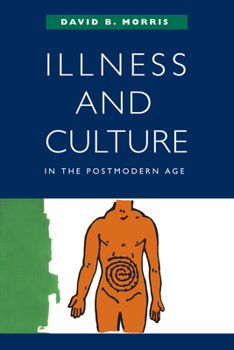Illness and Culture in the Postmodern Age
Select Format
Select Condition 
Book Overview
We become ill in ways our parents and grandparents did not, with diseases unheard of and treatments undreamed of by them. Illness has changed in the postmodern era--roughly the period since World War II--as dramatically as technology, transportation, and the texture of everyday life. Exploring these changes, David B. Morris tells the fascinating story, or stories, of what goes into making the postmodern experience of illness different, perhaps unique. Even as he decries the overuse and misuse of the term "postmodern," Morris shows how brightly ideas of illness, health, and postmodernism illuminate one another in late-twentieth-century culture.
Modern medicine traditionally separates disease--an objectively verified disorder--from illness--a patient's subjective experience. Postmodern medicine, Morris says, can make no such clean distinction; instead, it demands a biocultural model, situating illness at the crossroads of biology and culture. Maladies such as chronic fatigue syndrome and post-traumatic stress disorder signal our awareness that there are biocultural ways of being sick.
The biocultural vision of illness not only blurs old boundaries but also offers a new and infinitely promising arena for investigating both biology and culture. In many ways Illness and Culture in the Postmodern Age leads us to understand our experience of the world differently.
Modern medicine traditionally separates disease--an objectively verified disorder--from illness--a patient's subjective experience. Postmodern medicine, Morris says, can make no such clean distinction; instead, it demands a biocultural model, situating illness at the crossroads of biology and culture. Maladies such as chronic fatigue syndrome and post-traumatic stress disorder signal our awareness that there are biocultural ways of being sick.
The biocultural vision of illness not only blurs old boundaries but also offers a new and infinitely promising arena for investigating both biology and culture. In many ways Illness and Culture in the Postmodern Age leads us to understand our experience of the world differently.
Format:Paperback
Language:English
ISBN:0520226895
ISBN13:9780520226890
Release Date:August 2000
Publisher:University of California Press
Length:356 Pages
Weight:1.12 lbs.
Dimensions:0.8" x 6.0" x 9.0"
Customer Reviews
1 rating
Illness and Culture in the Postmodern Age
Published by Thriftbooks.com User , 23 years ago
Illness and Culture in the Postmodern AgeReviewer: Veronica S. Albin from Houston, TX USAI used Illness and Culture in the Postmodern Age for the first time this semester as a text book for Spanish 307 (The Language and Culture of Medicine and Health Care) at Rice University in Houston, TX. Most of the students enrolled in this advanced Spanish course are juniors and seniors headed for the top medical schools in the country.My students' response to the book was overwhelmingly positive. Their one complaint about it was that sometimes Morris required pages and pages to make a point and that by the time the point was made, the reader was fairly tired. Nonetheless, they unanimously labeled it as one of the most provocative books they had ever read, and that by having read it, they were now able to see the negative side of the biomedical model and the positive side of a biocultural model.Illness and Culture proved to be so rich in topics that all 35 students found not one but several topics that were of personal interest to them. Student athletes, for example, most of them headed to Physical Medicine and Rehabilitation, or to Sports Medicine, found the section on how the American fixation on sports and exercise backfired and instead of improving health, brought more medical problems to our society (ACL tears, stress fractures, tennis elbow, heat stroke, etc.) Students who have an interest in art were fascinated by the connections Morris establishes to the experience of illness. Those interested in literature found the sections on narrative outstanding. The chapter on suffering truly moved students in light of the recent events of September 11 and got them thinking about the suffering of others, not just our own. Students interested in linguistics and neuroscience were fascinated by Morris' chapter on the obscene and Tourette's syndrome. And, of course, the threat of bioterrorism was in everyone's mind and Morris' treatment of the subject proved to be highly stimulating.I start the course by telling my students that they need to write smart and different med school application essays in order to stand out. When I first ask them what they are going to write about, their answers are thoroughly predictable: they love medicine, love humankind, they believe in altruism, they want to study medicine because as good Christians, Jews, Muslims, etc., they want to relieve suffering. After reading Illness and Culture, my students no longer have good answers to my "what are you going to write about" question, for they realize that there are very few answers to most of Morris' provocative questions... and perhaps there are none. Instead they have a myriad intriguing thoughts and questions buzzing through their minds. And intriguing thoughts, without a doubt, are much better stimulants than boilerplate answers for writing intelligent med school application essays. Questions, in fact, make us better thinkers, they make us participate in human affairs. Questions stop u





